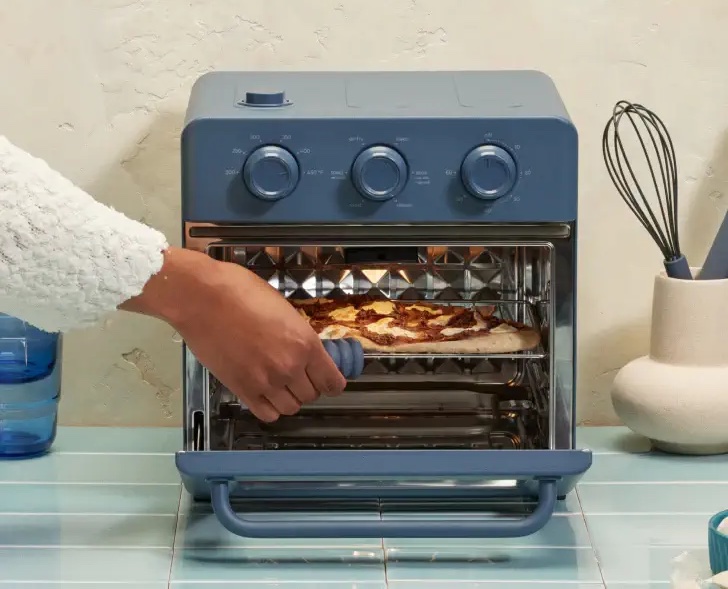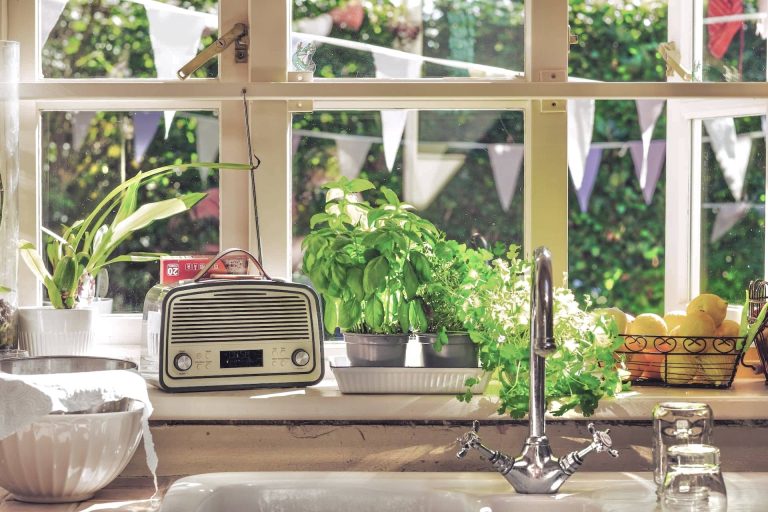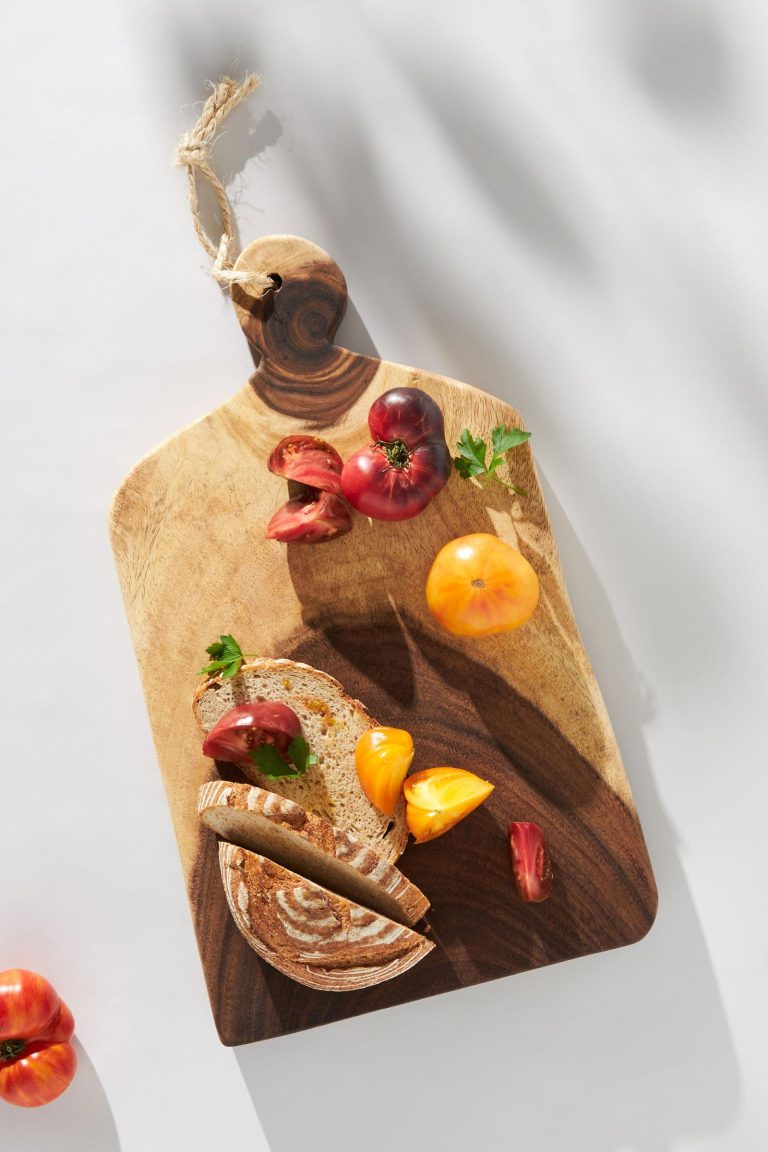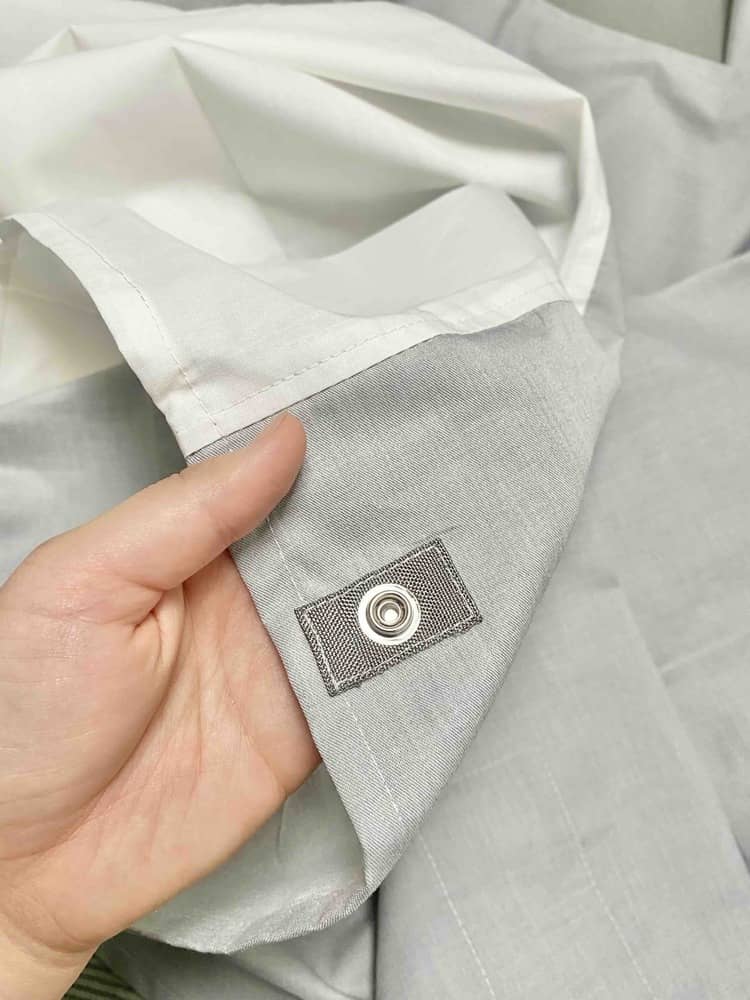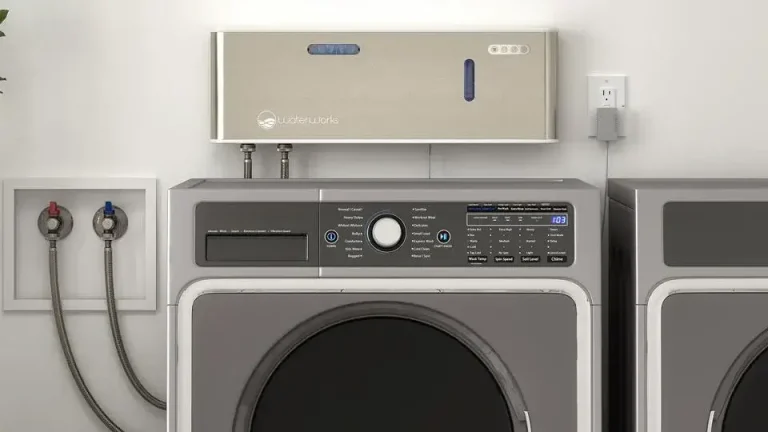How to Clean a Ceramic Pan Without Damaging It: 5 Easy Steps
Did you recently decide to buy a ceramic pan? Congrats. Ceramic pans are the healthiest, non toxic option out there. However, you can’t wash ceramic pans the same way as a traditional metal one – otherwise, you’ll quickly see your investment go down the drain.
Thankfully, caring for and cleaning your ceramic pans is easy. The key is to be gentle. Here are my go-to tips for how to clean a ceramic pan without damaging it, so that you can enjoy cooking with them for years to come.
How to Clean a Ceramic Pan: an Everyday Step-By-Step Guide
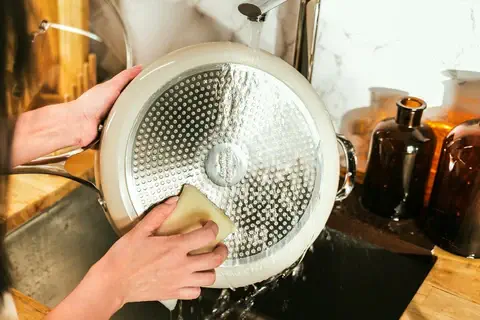
Here’s everything you need to know on how to properly clean your ceramic pan so that it stays like new:
1) Cool Down
After cooking with your ceramic pan, allow it to cool down completely before attempting to clean it. This will prevent any warping or damage from sudden temperature changes.
2) Skip the Dishwasher – Your Pan Needs Gentle Hands
Dishwasher detergents are often harsh and the heat from the dishwasher can also damage your ceramic pan. It’s best to wash it by hand with mild soap and a soft sponge or cloth.
Start by rinsing your ceramic pan with warm water. This will help loosen any food particles stuck on the surface. Add a small amount of mild dish soap to the warm water and mix it in. Avoid using harsh cleaners or abrasive sponges, as they can damage the non-stick coating.
3) Do NOT Use Steel Wool
Use a soft, non abrasive sponge instead to gently scrub the surface of the ceramic pan. Avoid using steel wool or harsh brushes that can scratch the coating.
4) Rinse and Dry
After rinsing off all soap residue from the pan, use a soft cloth to dry your ceramic pan. If you have hard water, this step is especially important as mineral buildup can affect the non-stick abilities of your pan over time.
5) Store Properly
Once your pan is completely dry, store it in a cool and dry place. Avoid stacking other cookware directly on top especially when wet. This will lead to scratches which may uncover the metal underneath the ceramic coating.
Once dry, use a pot and pan protector if you want to stack ceramic cookware or anything else on top of your pan.
Got a Burnt Ceramic Pan? Clean It the Right Way
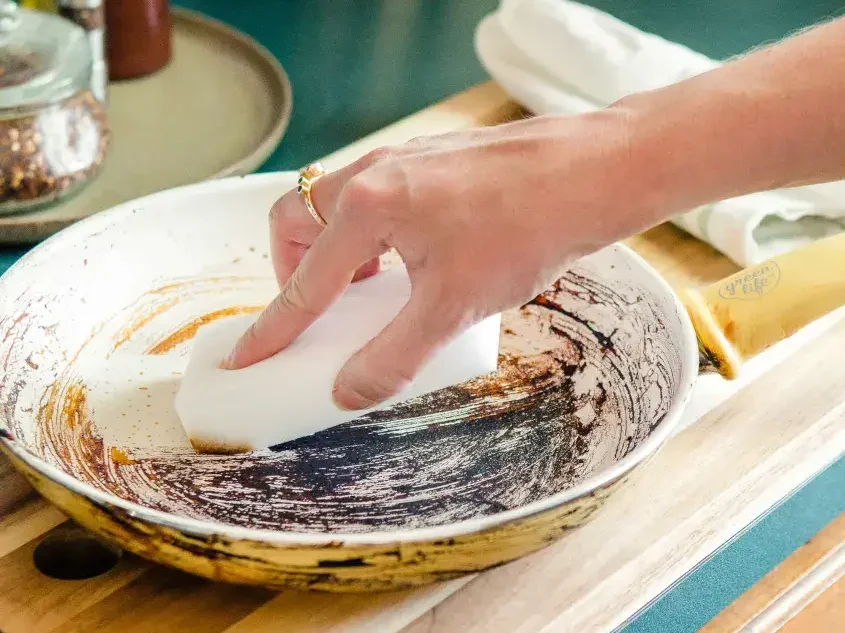
If you accidentally burnt your ceramic pan, don’t panic! It’ll be ok. Here’s how to clean it without damaging the coating:
1) Soak in Hot Water
Fill your ceramic pan with hot water and let it soak for at least 30 minutes. This will help loosen any burnt food particles.
2) Use Baking Soda and Vinegar
Create a paste using baking soda and vinegar, then apply it to the burnt areas of your pan. Let it sit for 15 minutes before gently scrubbing with a soft sponge.
3) Rinse and Dry
Once all the burnt bits have been removed, rinse your pan thoroughly with warm water. Scrub any remaining residue with a soft sponge. For any remaining residue, repeat the process again. Dry it off with a soft cloth.
Best Practices for Cooking with a Ceramic Pan
To ensure your ceramic pan lasts for a long time, it’s important to use it properly. Here are some tips:
1) Avoid High Heat
Avoid exposing your ceramic cookware to high heat, as this will deteriorate the non-stick coating. In fact, ceramic pans hold heat very efficiently, which means that you don’t need to use high heat to cook your food. Instead, cook using low to medium heat only.
2) Use Proper Utensils
Avoid using metal utensils on your ceramic pan, as they can scratch and damage the coating. Opt for wooden utensils instead.
3) Ditch the Cooking Sprays
Avoid using oil sprays or cooking aerosols – they actually break down the non stick coating. As the pan is already non stick, less is more – just water or a dash of oil will do.
4) Clean After Each Use
To prevent buildup of food residue and to maintain the non-stick surface, clean your ceramic pan after each use with mild soap, a soft sponge, and warm water.
Extra Tips for Maintaining Your Ceramic Cookware
- Use cooking oils sparingly when using ceramic pans. Too much oil can actually decrease its non-stick abilities.
- Do your dishes RIGHT AWAY! Stacking your used ceramic cookware in the sink makes them susceptible to scratching. I ruined my first ceramic pan this way when I put a knife into the sink, which scratched my ceramic pan. Learn from my mistake!
- Do not put your ceramic pans in the dishwasher. The harsh detergents and high heat can damage the coating.
- Store your ceramic pans carefully, preferably stacked with a cloth in between each pan to avoid scratches.
- If you accidentally overheat your ceramic pan, take it off the heat and let it cool down before using it again. Don’t put it directly in the sink as the sudden change in temperature could cause damage to the coating.
- If you notice any scratches or chips on your ceramic pan, stop using it immediately as this can cause food to stick and potentially contaminate your food. Check your warranty and/or consider buying a new one if necessary.
- If you have a gas stovetop, be sure to adjust the flame so it doesn’t exceed the diameter of your pan. This will prevent heat from reaching the sides and damaging the non-stick coating.
- If you have hard water, regularly clean the exterior of your ceramic pans with a mixture of vinegar and water to prevent mineral buildup. This can affect the performance and appearance of your cookware.
- Don’t let food residue sit on your ceramic pan for too long, as this can cause staining and decrease its non-stick abilities.
- Most importantly, always follow the manufacturer’s instructions for the care and use of your specific ceramic pan.
How to Clean Stains on Ceramic Pans
Ceramic pans are known for their non-stick properties, but over time, stains can still build up on the surface. Here are some tips for removing stains from your ceramic pans:
- Hydrogen Peroxide is a great stain remover for ceramic pans. Simply mix equal parts of hydrogen peroxide and water, then apply the solution to the stained area. Let it sit for 5-10 minutes, then scrub with a non-abrasive sponge or cloth. Rinse thoroughly.
- For tougher stains, make a paste using baking soda and water, then apply it to the affected area. Let it sit for 15-20 minutes, then scrub with a non-abrasive sponge or soft cloth. Rinse thoroughly.
What Exactly is Ceramic Cookware Anyway?
Before diving into cleaning tips, it’s important to understand what ceramic cookware actually is. Depending on the brand, ceramic cookware is made from a clay or a metal base such as aluminum and coated with a non-stick glazed clay that makes cooking and clean up easier.
This glazed clay coating also makes ceramic cookware free of any harmful chemicals like PFOA or PTFE (toxins that cause serious health issues like cancer and infertility). It’s for this reason that ceramic pans are an essential step in creating a non toxic kitchen.
Why You Need to Clean Ceramic Cookware Properly
Ceramic cookware is known for its non-stick properties, but this doesn’t mean it’s completely maintenance-free. To keep your ceramic pan in great shape, proper cleaning is essential. Otherwise, residues can build up on the surface, leading to a decrease in its non-stick abilities.
Harsh cleaning methods will also lead to scratching or damaging the non stick ceramic coating. Being gentle goes a long way to maintaining the longevity of your ceramic pan!
Wrapping Up + Learn From My Experience!
When I bought my first ceramic cookware set, I treated it as any old pan. Within just a few weeks, I’d scratched up and stained them. Even though I loved using my ceramic pans, I had to throw them out because the scratches were deep enough to reveal the metal base underneath. I had learned my lesson.
Don’t be like me! Take good care of your ceramic pans from the beginning. A little gentleness, baking soda, and warm soapy water will go a long way in ensuring your ceramic pans stay clean and non stick.
All in all – ceramic pans are one of the best and most convenient investments you’ll make for your health and your kitchen. Keep your ceramic pans in good shape and you’ll soon see why so many people rave about their ceramic cookware!


